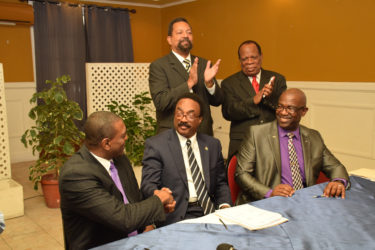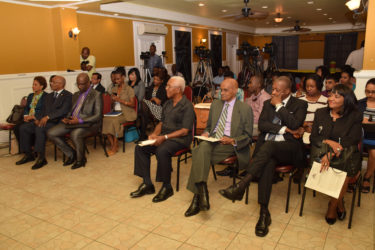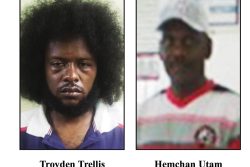The Guyana Government has entered into a partnership which will see the establishment of a law school here, giving University of Guyana (UG) graduates the opportunity to complete their legal education studies hassle free and at a lower cost.
Attorney General Basil Williams SC yesterday signed a Memorandum of Understanding (MoU) with the University College of the Caribbean (UCC) and the Law College of the Americas (LAC). He said a feasibility study will soon be done to determine the cost of the venture, but it was later stated that the investment could be in the region of US$75 million. The setting up of the school could end years of problems thatlocal students have had entering regional law schools.

Williams said that the JOF Haynes Law School will be built somewhere in the Turkeyen area and is expected to cater for between 200 and 400 students at a time, mainly from Guyana and Jamaica. Other Caricom nationals and persons from Commonwealth countries will also be accepted. The school is to be named for the late legal luminary JOF Haynes. Accreditation will be in order and the teaching will be of the “highest standard”, though no proposed price range was given for the two-year Legal Education Certificate programme.
Speaking during a signing ceremony at the Georgetown Club, Williams said that the Council of Legal Education (CLE) had “given us the permission” to establish a law school well over two decades ago. While noting that a lot of work went into making the venture a reality, Williams reminded all that Guyana’s law graduates often encounter problems with their placement at the Hugh Wooding Law School in Trinidad and Tobago. He said that there are thousands of LLB graduates who have been unable to enter both Hugh Wooding and the Norman Manley Law School in Jamaica, while the Eugene Dupuch Law School in The Bahamas was very expensive and “has its own problems.”

He said he had to “sell” the idea of the law school to Cabinet. “It is very important that this law school comes at this time… A bright future beckons for all law students… in a very beautiful environment here in Guyana,” he stressed.
Later, he told the media that the campus target date was 2018. He said government was hoping to get land space in the Turkeyen area, which is its first option. Asked about the possible cost of the project, he said that this will be determined in the feasibility study. Pressed for a figure, Williams insisted that there was none. “We couldn’t arrive at a figure because of the arrangement in this public/private partnership. Everything depends on the feasibility study but the shareholding …will be 70/30; 30% for the Guyana government and 70% for the partners,” he said adding that UCC and LCA are the investors and as such their contribution will be everything except the provision of the land for the building.
Williams did not respond clearly to questions about a possible phasing out of the arrangement with the Trinidad institution, which offers places to the top 25 Guyanese students each year.
Dr Trevor Hamilton, the advisor on the venture, said the school will operate under the auspices of the CLE which is the accreditation body and will be similar to the ones in Jamaica, The Bahamas and Trinidad.
Graduates from this new law school “will be called to the Bar in Georgetown… [and] all the other Caricom jurisdictions so that they can go and practise in Jamaica, in Trinidad [and] elsewhere in the Caribbean,” he said.
Hamilton noted that the Guyana-based facility’s focus will be beyond the two-year programme as it is widely known that those who have completed their studies require continuous education. “We work a lot in the justice system here and I can also tell you that every judge here needs continuing education. Every prosecutor needs continuing education and therefore that is going to be a major market,” he said, adding that new industries can be created out of law. “We are looking at the vision, the bigger picture… not just to train the conventional lawyer but to look at the whole legal industry and the legal service industry,” he said.
The investment model that will be used in this venture, he said, will involve government, and the private sector in a public/private partnership structured in such a way that “we see an education centre as one that calls for many players.” He said this investment can create many opportunities and could cost at least US$75 million.
Even locals could tap into this investment by providing accommodation to students, he said, adding. “It’s opportunities throughout.” And though the school will not only cater for the region but all Commonwealth countries, “We see it touching most Guyanese’s lives,” he said.
A business
“At the end of the day it is gonna operate like a business so it’s not a burden,” he stressed. Pointing out that Guyana is probably one of the cheapest places in the Caribbean to live, he stated that students across the region will get lots of cost benefits out of taking up places at the JOF Haynes Law School.
And while he could not predict what the growth would be like, he said it would probably start off on a small scale and expand over time. “We are hoping that in September [2017] the first cohort will be out there starting up… I am sure that UG will be an institutional partner in the school here,” he said, stressing that they were working to commence classes in September.
Williams had earlier given 2018 as the start date.
Hamilton joked that with the opening of the law school, “Guyana will never be the same again. Everybody can benefit.”
Meanwhile, Executive Chancellor and Interim President of the UCC Professor Dennis Gayle said the partnership will help to bridge the “significant gap between the demand for legal education in the region and provision for such education.” He said one of the advantages of the law school was that it would allow increased access to more law students facing space availability issues and the long wait to get in.
He said the partnership charts a new course for Caribbean co-operation between sovereign states and institutions of higher learning and also paves the way for other such collaborations in the future. He said that the LCA and UCC were excited about this partnership.
LCA Chairman Courtney Wynter congratulated government for its commitment to education, calling the planned law school a dream that has become true. He said it was a historic moment and the strength of this new institution, will be the strength of its capacity to end the void which causes duly qualified professionals to be unable to complete their legal education due to restrictive rules and practices.
UG Deputy Vice Chancellor Dr Barbara Reynolds, said in her remarks that the law school may remove what has been a challenge to UG law students for a long time. She noted that one may acquire an LLB, but before one can be called to the Bar, one must acquire a Legal Education Certificate (LEC). The spaces to do so she said are limited and as such many are precluded from acquiring a LEC, not on the basis of merit but on the basis of physical space. “There was something in that narrative that has not been quite right for a long time. And if the JOF Haynes Law School will reverse this situation, that in itself must be something positive for our graduates and for anyone who seeks to be admitted to the Bar,” she stressed.
Reynolds, while noting that a lot more work needs to be done, expressed hope that all will go well to ensure the smooth functioning of the institution. She agreed with Gayle that other areas of the law that are important to national and regional development agendas must be explored. “I hope the law school will go beyond just getting people out with a LEC,” she said adding that Guyana and the region need legal academics. “We do not have sufficient study of the law from an academic perspective as opposed to a practical perspective,” she said.
Also present were Minister of Education Dr Rupert Roopnaraine, Speaker of the National Assembly Dr Barton Scotland, President of the Guyana Bar Association Gem Sanford-Johnson, members of the UG Law Faculty and officials from the Attorney General’s Chambers.
LCA which is affiliated with UCC and Northumbria University in the UK markets itself as a college which aims to meet the needs of a wide range of students looking to complete a programme for certification in the legal education in the Caribbean.
Originally registered as the Chancellor Law School of the Americas its website explains that it was established by Dr. Velma May Brown Hamilton with a view to providing legal education to students in the Caribbean extending to Guyana in South America.








